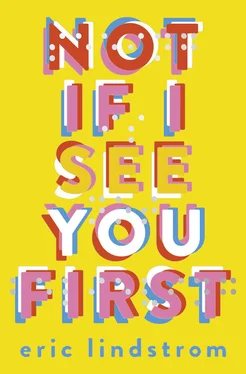First published in Great Britain by HarperCollins Children’s Books in 2016
HarperCollins Children’s Books is a division of HarperCollins Publishers Ltd,
HarperCollins Publishers
1 London Bridge Street
London SE1 9GF
www.harpercollins.co.uk
Not If I See You First
Text copyright © Eric Lindstrom, 2016
Cover artwork © Liz Casal
Eric Lindstrom asserts the moral right to be identified as the author of this work.
All rights reserved under International and Pan-American Copyright Conventions. By payment of the required fees, you have been granted the non-exclusive, non-transferable right to access and read the text of this e-book on screen. No part of this text may be reproduced, transmitted, down-loaded, decompiled, reverse engineered, or stored in or introduced into any information storage and retrieval system, in any form or by any means, whether electronic or mechanical, now known or hereinafter invented, without the express written permission of HarperCollins.
Source ISBN: 9780008146306
Ebook Edition © NOVEMBER 2015 ISBN: 9780008146337
Version: 2017-02-02
For all who love,
Especially
Shannon,
You got me started
Rachel,
You made me finish
Susan,
You keep me going
Be fearless
Contents
Cover
Title Page
Copyright
Dedication
Prologue
Chapter 1
Chapter 2
Chapter 3
Chapter 4
Chapter 5
Chapter 6
Chapter 7
Chapter 8
Chapter 9
Chapter 10
Chapter 11
Chapter 12
Chapter 13
Chapter 14
Chapter 15
Chapter 16
Chapter 17
Chapter 18
Chapter 19
Chapter 20
Chapter 21
Chapter 22
Chapter 23
Chapter 24
Chapter 25
Chapter 26
Chapter 27
Chapter 28
Chapter 29
Chapter 30
Chapter 31
Chapter 32
Acknowledgments
Keep Reading …
About the Author
About the Publisher
 y alarm buzzes and I slap it off and tap the speech button at the same time. Stephen Hawking says, “Five-fifty-five AM.” Just double-checking, like always.
y alarm buzzes and I slap it off and tap the speech button at the same time. Stephen Hawking says, “Five-fifty-five AM.” Just double-checking, like always.
I crank open the window and stick out my hand. Cool, misty, but not too humid. Probably overcast. I pull on clothes—sports bra, sleeveless shirt, shorts, track shoes—without bothering to check anything, since all my running clothes are black.
Except my scarves. I finger through them, checking the plastic tags, gauging my mood. I feel strangely unsettled, so I pick one that might help: the yellow cotton with embroidered happy faces. I tie it around my head like a blindfold, settling a smile on each of my closed eyelids.
The rising sun is warm on my cheeks; the sky must be clear, at least at the horizon. I lock the front door and slip the cold key into my sock. Where the path turns to sidewalk, I turn right and start to jog.
The three blocks to the field are programmed into my feet, my legs, my equilibrium. After seven years of this I know every bump, every crack, every exposed root in the sidewalk. I don’t need to see where I’m running; I can feel it.
“Parker, STOP !”
I stumble to a halt, waving my arms like I’m at the edge of a cliff. And if a backhoe came yesterday, I very well could be.
“I’m so sorry, Parker!” It’s Mrs. Reiche’s suffering-suburban-housewife voice calling from her porch. Now she’s trotting down the driveway, keys jangling. “Len’s brother came last night …”
I try not to imagine running into the side of his van. I walk forward, hands out, until I touch cold, dew-covered metal. “You don’t have to move it.” I trace my fingers along the slick car body as I walk around.
“Of course I’ll move it. It’ll be gone when you get back.”
I find the sidewalk again and continue as the van growls behind me. I wait at the corner until Mrs. Reiche shuts it off to listen for traffic. I hear nothing but chattering birds, so I step into the intersection.
When I touch the chain link fence of Gunther Field I turn right. Fourteen steps to the gap and a left turn through it, one hand slightly forward in case today is the first time in years I misjudged the distance. I pass straight through, like always.
The field is over a hundred yards across. If any new obstacles have shown up since yesterday chances are low I’ll find them with a single walk-through, but as crazy as it is to run here at all it’s even crazier without walking it first.
I reach the far fence at one hundred and forty-two steps. Pretty typical and all clear. After a few more minutes of stretching, I’m ready to run. Seventy-five strides at a fair pace, a couple dozen walking steps to touch the far fence, and back again.
After five turns, it’s time to sprint.
Sixty strides gets me within two dozen walking steps of the far side. Then sidestep a bit to line up again because of drift. The still air is warmer than yesterday but feels cool as I fly through it. The worst heat of summer is weeks away.
Ten sprints and I’m done. After crossing the street I jog to cool down, but I slow to a walk near the Reiches’ driveway. I heard the car move but once a problem occurs to you it takes a while to forget it. On the other side where the driveway slopes up to become sidewalk again, I speed up.
The instant I open the front door I know something’s wrong. I don’t smell any breakfast. Even cereal days include toast. In the kitchen I hear only the normal sounds of a sleeping house: refrigerator humming, clock ticking over the stove, my breathing, and when I stop that to listen more closely, my heartbeat.
I head for the stairs and stumble on something in the hall. I squat and find my dad lying on the floor, wearing flannel pajama bottoms and a T-shirt.
“Dad? Dad! Are you okay?”
“Parker,” he says, his voice oddly flat. Not strained or injured.
“Did you fall? What happened?”
“Listen,” he says, still sounding nothing like he should if he were really lying at the base of the stairs. “Everyone has secrets, Parker. Everyone is a secret.”
That’s when I wake up, like always, but it’s exactly what really happened last June third, the week after school let out and two weeks after my sixteenth birthday.
Well, except for two things. One, I really did almost run into the Reiches’ van, but that was a different day a couple weeks later. And two, my dad wasn’t lying at the bottom of the stairs. I found him still in bed, and he’d been dead for hours.
 arissa is sobbing. Again.
arissa is sobbing. Again.
“And then he … he … he didn’t …” Her deep voice almost sounds like grunting.
Pathetic. And she’s smart, too, except about Owen.
“Can’t you guys talk to him?”
I don’t reply and neither does Sarah. We offer good advice—for free even—but never get involved. We’ve told Marissa this countless times; it would waste oxygen to say it again. We just have to wait for her to dry out. There’s nothing to do till the bell rings anyway.
Читать дальше


 y alarm buzzes and I slap it off and tap the speech button at the same time. Stephen Hawking says, “Five-fifty-five AM.” Just double-checking, like always.
y alarm buzzes and I slap it off and tap the speech button at the same time. Stephen Hawking says, “Five-fifty-five AM.” Just double-checking, like always.











